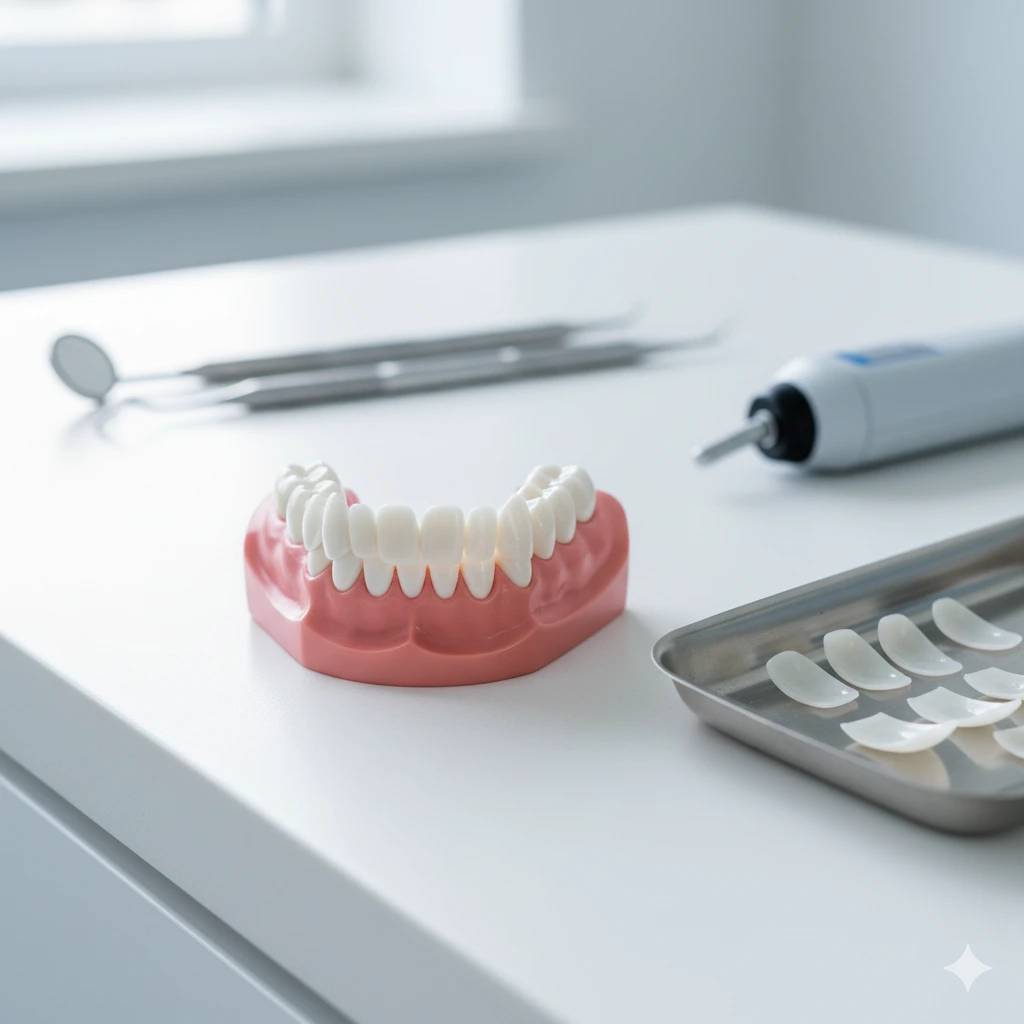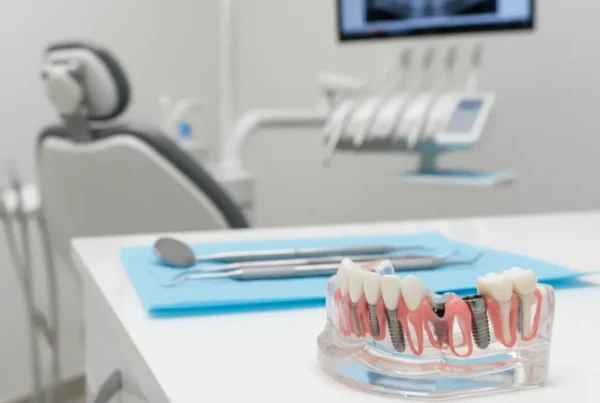Getting dental implants is like building a house – you need a strong foundation for everything to work properly. Your health is that foundation, and understanding what your body needs to be ready for implants helps ensure your new teeth will last for decades. Dr. Behrooz Khademazad has helped Grand Prairie patients prepare for successful implants for 34 years, and he knows that the healthier you are before surgery, the better your results will be.
Why Your Overall Health Matters
Your body needs to be in good shape to heal properly after implant surgery. Think of it like this: when you get a cut, your body sends special healing cells to fix the damage. The same thing happens with dental implants, but your jawbone needs to grow around the implant to hold it securely. If your body isn’t healthy, this healing process doesn’t work as well.
Certain health conditions can make implant healing more difficult. Diabetes is one of the biggest concerns because high blood sugar levels slow down healing and make infections more likely. Dr. Khademazad works closely with patients who have diabetes to make sure their blood sugar is well-controlled before implant surgery.
High blood pressure is another condition that needs attention before implants. When your blood pressure is too high, you might bleed more during surgery, which can cause problems with healing. The good news is that most health conditions can be managed well enough to allow for successful implant treatment.
Your immune system also plays a huge role in implant success. When your immune system is working well, it helps your body accept the implant and fight off any bacteria that might cause infections. Dr. Khademazad evaluates each patient’s overall health to make sure their body is ready for the implant process.
Making Healthy Lifestyle Choices
The choices you make every day have a big impact on whether your implants will be successful. Some habits help your body heal better, while others can cause serious problems. Dr. Khademazad has seen how lifestyle changes can dramatically improve implant outcomes for his Grand Prairie patients.
Smoking is probably the worst thing you can do if you want successful implants. When you smoke, it reduces blood flow to your gums and jawbone, making it much harder for your body to heal properly around the implant. Smokers have implant failure rates that are two to three times higher than non-smokers.
Drinking too much alcohol also interferes with healing. Alcohol can slow down your body’s ability to repair itself and can interfere with how well your bone grows around the implant. Dr. Khademazad recommends limiting alcohol intake both before and after implant surgery to give your body the best chance to heal.
Here are the lifestyle changes that help implants succeed:
- Stop smoking completely at least two weeks before surgery
- Limit alcohol consumption to support proper healing
- Eat a healthy diet rich in vitamins and minerals
- Get regular exercise to improve blood circulation
- Manage stress through relaxation techniques or counseling
Making these changes isn’t always easy, but Dr. Khademazad and his team provide support and resources to help patients succeed. Many patients find that preparing for implants motivates them to adopt healthier habits that benefit their overall well-being, not just their dental health.
Getting Your Mouth Ready
Your mouth needs to be in excellent condition before you can get implants. Just like you wouldn’t plant a garden in soil full of weeds, you can’t place implants in a mouth that has gum disease or other problems. Dr. Khademazad always makes sure any existing dental issues are resolved before implant placement.
Gum disease is one of the most common problems that needs to be treated first. When bacteria infect your gums, they can also attack the tissues around an implant, causing it to fail. The Dallas-Fort Worth area has excellent resources for treating gum disease, and Dr. Khademazad works with specialists when needed to ensure optimal gum health.
Professional dental cleanings are essential before implant surgery. These cleanings remove tartar and bacteria that regular brushing and flossing can’t eliminate. Having the cleanest possible mouth before surgery reduces the risk of infection and helps ensure proper healing.
Daily oral hygiene becomes even more important when you’re preparing for implants. Brushing twice a day, flossing daily, and using an antibacterial mouthwash help create the healthy environment your mouth needs for successful implant placement. Dr. Khademazad’s team teaches patients the best techniques for keeping their mouths healthy.
Your Personal Health Evaluation
Every patient is different, which is why Dr. Khademazad conducts a thorough evaluation before recommending implants. This evaluation looks at your medical history, current health status, and any factors that might affect implant success. The goal is to identify and address any potential problems before they can interfere with your treatment.
Your medical history tells an important story about your health. Conditions like osteoporosis, autoimmune diseases, or heart problems can all affect how well implants work. Dr. Khademazad reviews all your medications and health conditions to create a treatment plan that works with your specific situation.
Advanced imaging technology helps Dr. Khademazad see exactly what’s happening inside your jawbone. These detailed pictures show whether you have enough bone to support an implant and help him plan the best placement for optimal results. This careful planning is one reason why experienced dentists have such high success rates.
| Health Factor | Why It Matters | How It’s Evaluated |
| Bone Density | Supports implant stability | 3D imaging and bone quality assessment |
| Gum Health | Prevents infection around implant | Periodontal examination and probing |
| Medical History | Identifies potential complications | Comprehensive health questionnaire |
| Medications | May affect healing or bleeding | Review of all current prescriptions |
Sometimes Dr. Khademazad needs to work with your other doctors to optimize your health before implants. For example, if you have diabetes, he might coordinate with your endocrinologist to ensure your blood sugar is well-controlled. This team approach gives you the best possible chance for successful implants.
Watching for Warning Signs
After your implants are placed, staying alert for any signs of problems helps catch issues early when they’re easier to treat. Dr. Khademazad teaches all his patients what to watch for and when to call the office. Early detection of problems can often prevent implant failure and save your investment in dental health.
Changes around your implant site should always be reported to Dr. Khademazad’s office. This includes increased tenderness, swelling that doesn’t go away, or any unusual sensations. While some discomfort is normal immediately after surgery, persistent or worsening symptoms may indicate a problem that needs attention.
Bleeding or discharge around an implant is never normal after the initial healing period. These symptoms could indicate an infection that threatens the implant’s stability. Dr. Khademazad’s team can quickly diagnose and treat infections before they cause serious damage to the implant or surrounding tissues.
Here are important warning signs to watch for after implant placement:
- Persistent pain or discomfort that doesn’t improve over time
- Swelling or redness around the implant site
- Unusual bleeding or discharge from the gum area
- Changes in how the implant feels when you bite down
- Loosening of the implant crown or visible movement
Regular follow-up visits with Dr. Khademazad allow for professional monitoring of your implant health. During these visits, he can detect subtle changes that you might not notice and address any concerns before they become serious problems.

Working Together for Success
Successful dental implants require teamwork between you and Dr. Khademazad’s experienced team. Your role includes following pre-operative instructions, maintaining excellent oral hygiene, and keeping all follow-up appointments. Dr. Khademazad’s role includes careful planning, skilled surgery, and ongoing monitoring of your implant health.
Patient education is a cornerstone of Dr. Khademazad’s approach to implant dentistry. He takes time to explain exactly what you need to do to prepare for surgery and how to care for your implants afterward. This education empowers you to take an active role in your treatment success.
Sometimes complex cases require consultation with specialists like periodontists or oral surgeons. Dr. Khademazad has built relationships with excellent specialists throughout the Grand Prairie area and coordinates care when needed. This collaborative approach ensures that every aspect of your treatment is handled by the most qualified professionals.
Clear communication between you and the dental team is essential throughout the implant process. Don’t hesitate to ask questions or voice concerns at any point during your treatment. Dr. Khademazad and his team are committed to ensuring you feel informed and comfortable every step of the way.
Maintaining Your Investment
Once your implants are successfully placed and healed, ongoing care is essential to protect your investment. Implants can last a lifetime with proper care, but they do require consistent attention and professional maintenance. Dr. Khademazad has seen patients enjoy their implants for decades when they follow proper care protocols.
Professional cleanings and checkups become even more important when you have implants. These visits allow Dr. Khademazad to monitor your implant health and clean areas that are difficult to reach with home care. Special tools and techniques are used to clean around implants without damaging them.
Daily home care for implants is similar to caring for natural teeth but with some important differences. You’ll need to be extra careful about removing plaque and bacteria from around the implant crown and gum line. Dr. Khademazad’s team provides specific instructions and demonstrates proper techniques for each patient’s unique situation.
Long-term success with dental implants comes from the partnership between you and Dr. Khademazad’s team. With his 34 years of experience in Grand Prairie and your commitment to following care instructions, your implants can provide you with a beautiful, functional smile for many years to come.
Your Path to Successful Implants
Meeting the health requirements for dental implants isn’t complicated when you have the right guidance and support. Dr. Khademazad’s comprehensive approach to patient care ensures that you’re fully prepared for successful implant treatment. From the initial health evaluation through long-term maintenance, every step is designed to maximize your chances of success.
The investment you make in preparing your health for dental implants pays dividends for years to come. Patients who take the time to optimize their health before implants often find that they not only have better dental outcomes but also enjoy improved overall well-being. Dr. Khademazad has guided thousands of Grand Prairie patients through this process successfully.
Your journey to dental implants begins with understanding what your body needs to be ready for this life-changing treatment. With proper preparation, skilled treatment, and ongoing care, dental implants can restore your smile and your confidence for decades to come.
Schedule your consultation today with Dr. Behrooz Khademazad and discover what personalized dental care in Grand Prairie, TX truly feels like.
Schedule Your Consultation Today!
2475 W Pioneer Pkwy Grand Prairie, Texas, 75051
Google Reviews: See More Reviews From Grand Prairie Family Dental
View information about local places in our community.
Driving Directions to Our Practice
Frequently Asked Questions
What health conditions could affect my dental implant success?
Certain health conditions like unmanaged diabetes, osteoporosis, or autoimmune diseases can affect healing and implant integration. However, most conditions can be managed effectively to allow for successful implant treatment. Dr. Khademazad works with patients to optimize their health before proceeding with implants, often coordinating with other healthcare providers to ensure the best possible outcome.
How important is oral hygiene for dental implant success?
Excellent oral hygiene is absolutely crucial both before and after getting dental implants. Poor oral hygiene can lead to infections that threaten implant stability and longevity. Dr. Khademazad emphasizes that patients who maintain meticulous oral care have the highest success rates and longest-lasting implants.
Can lifestyle changes improve my chances for successful implants?
Yes, lifestyle changes can dramatically improve your implant success rate. Quitting smoking is the most important change you can make, as smoking significantly increases failure rates. Reducing alcohol consumption, eating a healthy diet, and managing stress all contribute to better healing and long-term implant success.






